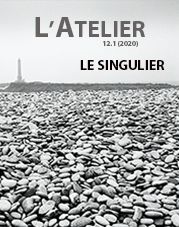"Singularity in its Mineral Actuality”: The Texture of Moral Life in Iris Murdoch’s The Sea, The Sea (1978)
Résumé
This paper looks at the way Iris Murdoch’s moral particularism—her vision of morality as a perception of particulars transcending general rules and classification—shapes her works of fiction, more specifically her 1978 Booker Prize winning novel The Sea, The Sea. Told from the perspective of Charles Arrowby, an egotistical theatre director who has withdrawn from the world in the seaside town of Narrowdean, the novel describes the different steps in Charles’s incomplete spiritual journey, from a self-centred world-view, based on the intimate conviction of his own exceptionality as an artist, to a partial awareness of the plurality of moral experience, from the limitations of a state of moral exception, based on his psychological ascendancy over others, to a partial acceptance of singularity (“singularité quelconque”). The liminal coastal scenery and the constantly shifting seascape, which at once isolate the character and open him up to the vast contingency of the world, embody this tension between the exceptionality of the egotistical self and the complexity of a sea of particulars.
Téléchargements
Publiée
Numéro
Rubrique
Licence
-
L’envoi spontané d’un article à la rédaction de L’Atelier implique l’autorisation de publication et la cession des droits dans les limites établies par la loi de propriété intellectuelle.
-
L’Atelier conserve les droits de reproduction des articles publiés, quelque soit le support : internet, CD ROM, réimpression, photocopie, etc.
-
L’auteur conserve le droit de publier ultérieurement son article déjà paru dans L’Atelier avec la seule obligation de mentionner le nom de la revue comme source de la première publication.


